- Editorial
- Project progress
- STARGATE reports
- What's new with STARGATE
- Adapting agricultural practices to changing climatic conditions
- Conferences & Events
- News to read
- Stay updated
Editorial
Dear STARGATErs,
In our ultimate newsletter we present STARGATE's contribution beyond the state-of-the-art in applied climatic data solutions in “Project Progress”. “STARGATE reports” its latest peer reviewed publications and the most recent news are available in “What's new with STARGATE”. In this issue we explain why Climate Smart Agriculture is important for “Adapting agricultural practices to changing climatic conditions” and present prominent “Conferences & Events”.


Project progress
STARGATE's contribution beyond the state-of-the-art in applied climatic data solutions is the implementation of analytics models to support local and regional policy formulation and implementation related to the mitigation of microclimate changes. Once the policy development process expands the evidence base and data sources beyond the traditional approach, there will be a need for global data sets for comparative analysis including meteorological, climatic analysis, and satellite data sources to improve decision-making processes. STARGATE is leveraging access to these data and its climatic platforms including developed model platforms to foster easy adoption by policymaking bodies and provides innovative components for the visualization of big data with an emphasis on geospatial visualization and dynamic charting. STARGATE results may be further developed in other projects, or adapted to broader contexts, providing opportunities for influencing policies in a wide range of issues, so that project results last longer and benefit more interested parties.
Over a three-year journey, STARGATE has achieved significant progress towards the aforementioned objectives and presents its main achievements!!!
- A strong stakeholder community of farmers, farmers associations, agronomists, water managers, public sector agencies, government, agribusinesses, civil society organizations and experts has been developed in 6 countries.
- 16 use cases have been identified covering different aspects of crop and livestock production, as well as different agroclimatic zones and user segments.
- A detailed user requirements database has been created based on the needs of pilot sites in weather/climate information including their spatiotemporal characteristics.
- A workflow chain for an atmospheric data assimilation system has been developed, using satellite, and ground-based observations and producing high-quality atmospheric analysis fields.
- A system providing weather forecasts of up to 7 days was built from 3 different operational weather prediction models.
- A system providing operational climate predictions of one to 6months has been elaborated presenting climate predictions in a meaningful way that can guide the decision process chain of the agricultural sector.
- Climate risk scenarios have been established for each pilot use case based on temperature, precipitation, solar radiation, soil moisture, wind, and crop type.
- 16 different agro-climatic indicators have been developed that consider all the aspects of climate impact on the agricultural production of each pilot site.
- Several numerical experiments in 3 pilot areas, quantified the impact of irrigated/non-irrigated and till/no-till agriculture in the near-surface atmospheric environment, especially on the intensity of extreme weather events.
- A climatological analysis for each use case has been performed relevant to temperature, precipitation, relative humidity, evapotranspiration, solar radiation, and wind.
- A STARGATE suite has been designed to support policymakers, farmers, and agricultural consultants to efficiently use agricultural inputs and energy, while reducing agricultural emissions and preserving the environment using the state of the art of precision farming methodologies (i.e., earth observations and weather data, crop models and machine learning algorithms ).
- A suitability methodology has been implemented for efficient land-use planning and crop variety selection to enhance the adaptability of the farming sector in the pilot sites under a changing climate.
STARGATE reports
Access the latest peer reviewed project scientific publication and learn to what extent the temperature inside a sheep barn can be maintained within the range of the thermoneutral zone during winter, primarily to increase feed conversion and to reduce GHG emissions.
Lithourgidis, A.A.; Firfiris, V.K.; Kalamaras, S.D.; Tzenos, C.A.; Brozos, C.N.; Kotsopoulos, T.A. Energy Conservation in a Livestock Building Combined with a Renewable Energy Heating System towards CO2 Emission Reduction: The Case Study of a Sheep Barn in North Greece. Energies 2023, 16, 1087.
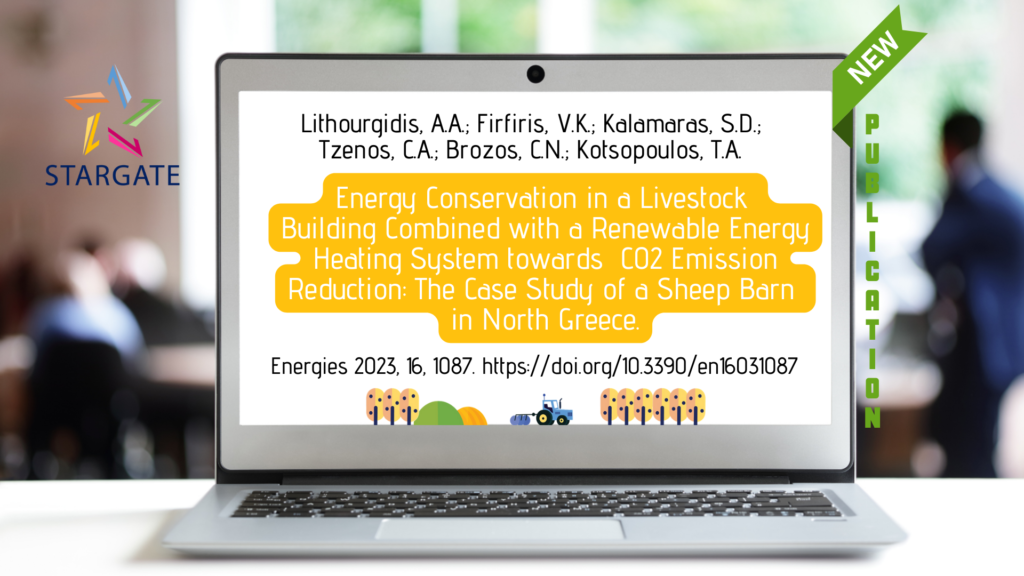 Are you interested in more project findings?
Are you interested in more project findings?
STARGATE publications series in peer-reviewed journals
and international conferences are available here.
What's new with STARGATE
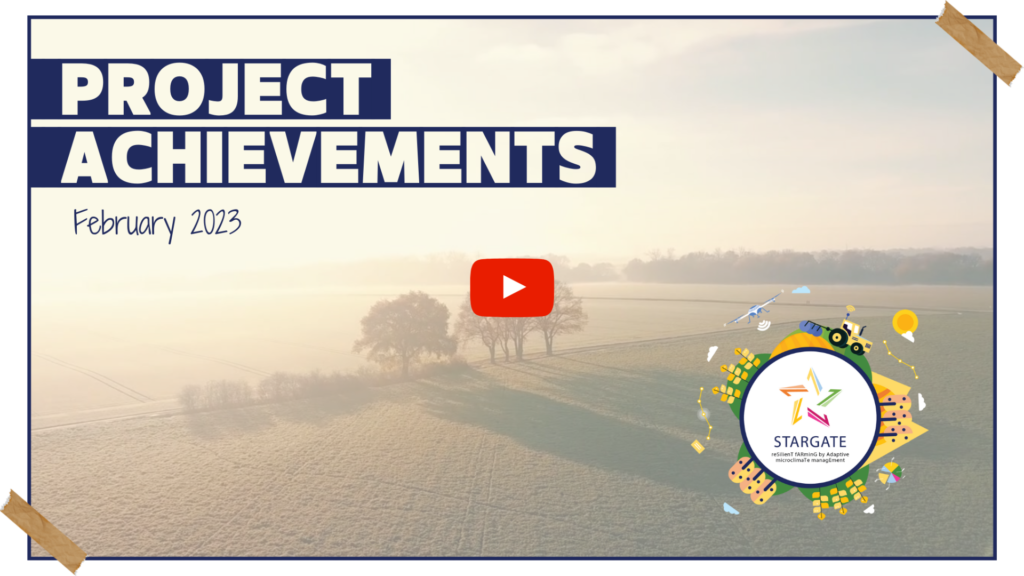 STARGATE in motion
STARGATE in motion
STARGATE enjoys presenting project progress “in motion” and new videos are being released. Watch our latest videos, presenting all project scientific publications, the latest project achievements, the updated version of the STARGATE library, and more by clicking here. And of course, don’t forget to subscribe on our YouTube channel to stay updated for the latest news!
 STARGATE review meeting
STARGATE review meeting
STARGATE partners met physically and online on the 17th of February to report project progress and achievements over the 2nd review meeting. The partners presented the project objectives per WP and the extent to which they have been accomplished. The Consortium was coordinated by Prof. Dr. Dionysis Bochtis.
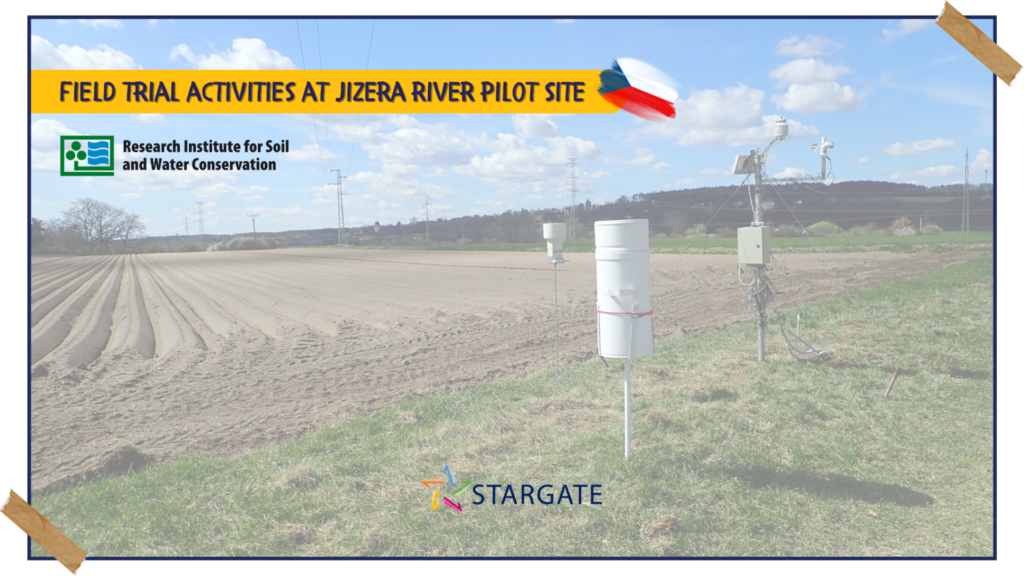 STARGATE field trials
STARGATE field trials
VUMOP (THE RESEARCH INSTITUTE FOR SOIL AND WATER CONSERVATION) is carrying out field trials at Jizera River pilot. VUPOR monitors soil moisture and meteodata to derive the precise crop water requirement data for effective irrigation doses and verification of remotely sensed information by using soil moisture monitoring equipment. The meteorological station is equipped to measure / provide data on several parameters. Read more...
Adapting agricultural practices
to changing climatic conditions
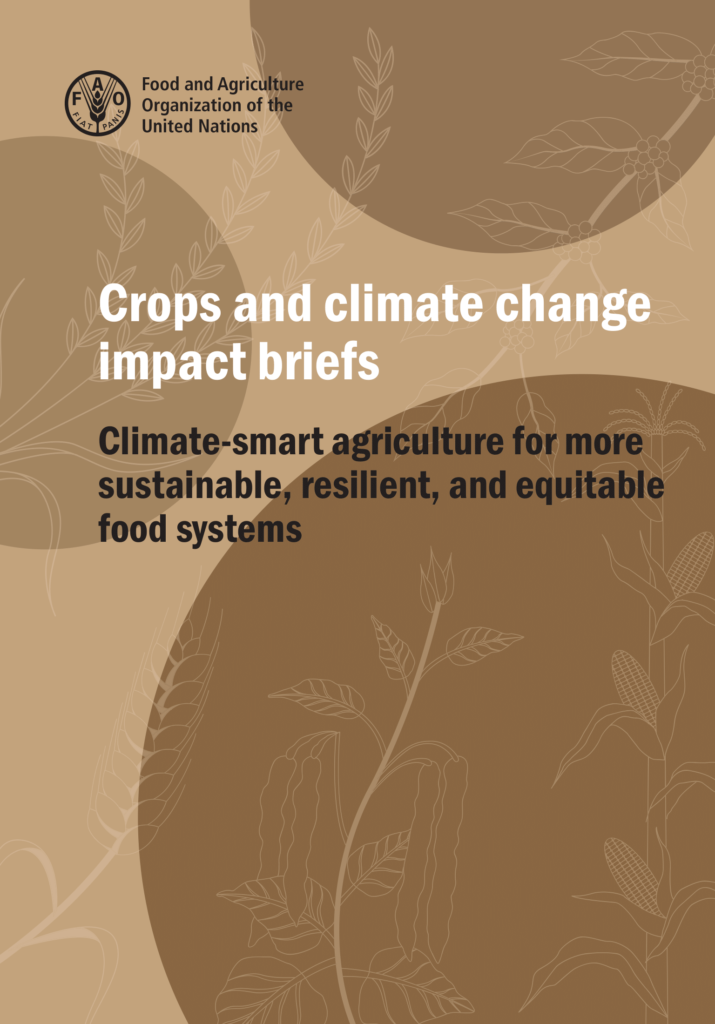 Climate change is one of the greatest challenges of our time posing serious threats to food security and it is expected to continue to threaten crop production and livelihoods, cause further increases in food prices, and negatively affect nutrition, biodiversity, and labour productivity.
Climate change is one of the greatest challenges of our time posing serious threats to food security and it is expected to continue to threaten crop production and livelihoods, cause further increases in food prices, and negatively affect nutrition, biodiversity, and labour productivity.
Innovation is particularly urgent in the agricultural sector, where there are substantial opportunities to transform agri-food systems and create synergies that can accelerate progress toward achieving several important goals, including Nationally Determined Contributions (NDCs) under the Paris Agreement and the Sustainable Development Goals (SDGs). Governments have acknowledged the significant contribution that agriculture makes to climate change. The agriculture sector, together with forestry and land-use change, is responsible for roughly 20% of anthropogenic greenhouse gas (GHG) emissions (FAO, 2021; IPCC, 2019).
The agriculture sector is being increasingly regarded as a key sector for implementing climate change mitigation and adaptation measures that can contribute to achieving climate targets. Agriculture, by sequestering carbon in biomass above and below the ground and in the soil, can provide a unique pathway for responding to climate change. Farmers, who are under increasing pressure to adapt their practices and engage with new technologies to maintain production levels, can play a key role in mitigating climate change. Climate-smart agriculture (CSA) and sustainable cultivation practices can lead to the reduction of GHG emissions and increase carbon sequestration in biomass and the soil.
CSA recognizes that there are critical synergies between climate change mitigation and adaptation, and sustainable agricultural production and exemplifies the approach that is required to make the shift to more resilient agri-food systems. The successful transition to CSA and the implementation of specific CSA practices involves the establishment of an enabling environment that encompasses conducive institutional arrangements, appropriate infrastructure, processes to ensure the engagement of all stakeholders, measures to foster gender equality, and mechanisms to increase the access of small-scale farmers to credit, insurance, extension and advisory services. The scaling up of CSA also requires a strong political commitment to underpin the necessary level of coordination among interlinked stakeholders from diverse domains, including climate action, food security and agricultural development. Supportive policies that can facilitate the access of small-scale farmers to critical sources of finance need to be implemented. All these elements must fit together to create a solid foundation that can allow CSA to be scaled up and achieve large-scale transformations of the food system.
To support farmers in the transition to CSA and sustainable agricultural production, FAO has produced a series of briefing notes to inform policymakers and other stakeholders about recommended practices. The selected crops that are critical to the global agri-food sector, entail coffee, cowpea, maize, rice and wheat. For these crops good practices are presented in relevance to the contributions they can make toward achieving the SDGs.
The practices recommended by FAO address poverty (SDG1), gender equality (SDG5), clean water and sanitation (SDG6), employment and economic growth (SDG8), sustainable consumption and production (SDG12), forging partnerships (SDG17) and the conservation of marine resources (SDG14). The application of these practices requires a deep knowledge of local ecosystems and their components, strengthen capacities for using specific methods and technologies and adjusting them to the local context. Therefore, the scaling up of CSA requires the implementation of practical training that develops technical and vocational skills in rural communities (SDG4). Integrated Pest Management and improved efficiency in the use of nutrients and fertilizers can benefit human health by reducing illnesses associated with air, water and soil pollution and contamination (SDG3). Reducing fuel consumption by adopting conservation agriculture practices allows for energy savings and increased energy efficiency (SDG7). A further contribution to SDG7 is the conversion of waste and residues to bioenergy, which can help to ensure access to affordable, reliable, sustainable and modern energy for all.
Climate change threatens food security and overall human well-being. During the next decade, considerable work will need to be done to achieve the climate goals of the Paris Agreement. It is therefore important to learn from past experience and research findings to transform our food systems while there is still time...
SOURCE: FAO. 2022. Crops and climate change impact briefs
– Climate-smart agriculture for more sustainable, resilient, and equitable food systems. Rome.
Conferences & Events
 The GACSA Annual Forum 2023
The GACSA Annual Forum 2023
![]() May 4-5, 2023
May 4-5, 2023
![]() Rome, Italy
Rome, Italy ![]() Info
Info
The Global Alliance for Climate Smart Agriculture (GASCA) Annual Forum will be hosted in Rome, Italy, with a possibility of virtual attendance via zoom platform. It will take place on the 4th and 5th of May 2023, whilst its concept note is framed around GACSA's crosscutting themes of youth, women, and finance, emphasizing in all sessions the central role of farmers. In addition, the Annual Forum will focus on showcasing the new activity proposals, giving the opportunity to all GACSA members to be more involved with the Alliance, as these proposals focus on accelerating GACSA’s multi-stakeholder actions, creating new tools, and sharing knowledge to lead positive change.
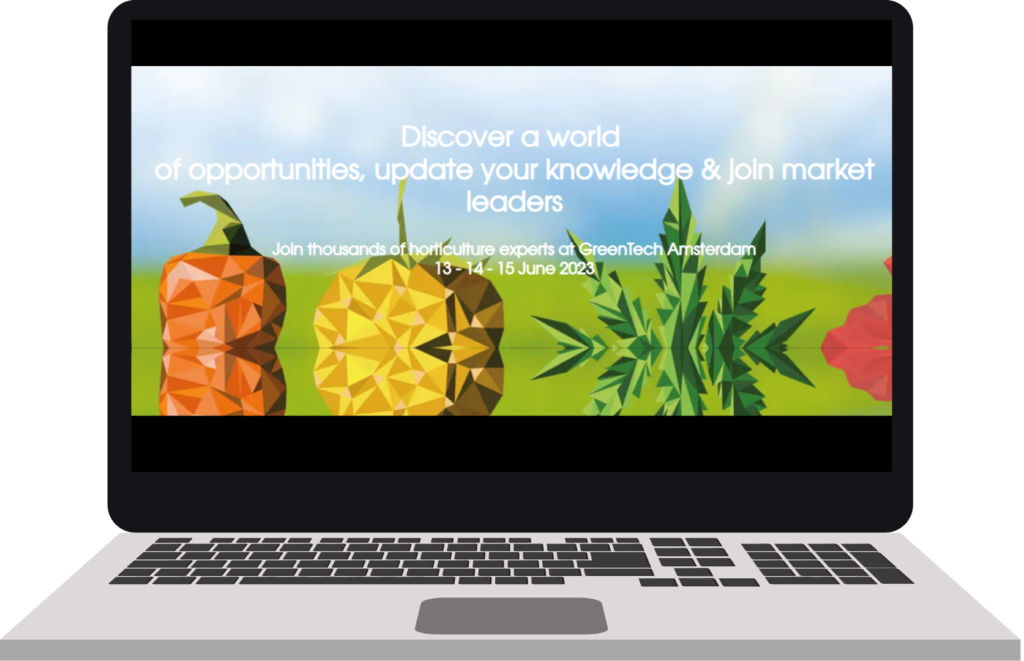 GreenTech Amsterdam
GreenTech Amsterdam
![]() June 13-15, 2023
June 13-15, 2023
![]() Amsterdam, Netherlands
Amsterdam, Netherlands ![]() Info
Info
GreenTech is the global meeting place for all professionals involved in horticulture technology and it will be held from 13 - 15 June 2023 in RAI Amsterdam. The GreenTech exhibition inspires, excites, and connects growers & breeders, suppliers, and investors in the field of cultivation. Everything at GreenTech Amsterdam 2023 can be traced back to four pillars, which form the blueprint of the exhibition, namely within the centre Crops, Water, Energy and People. The #1 horticulture technology platform event in Amsterdam, will offer visitors a complete overview of the products and services of the world’s leading companies and innovators.!
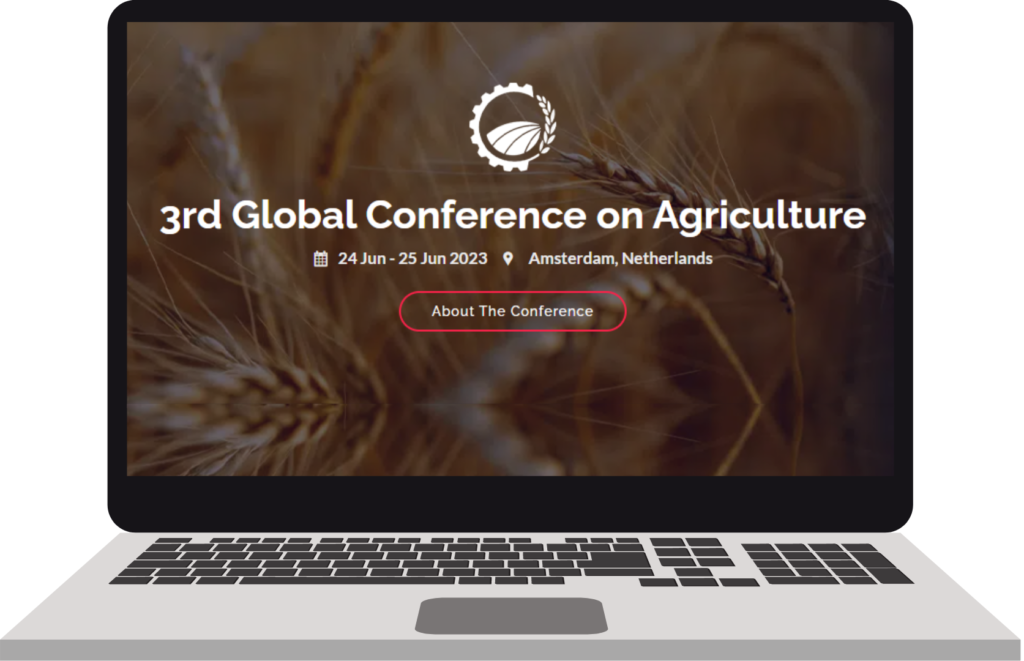 The 3rd Global Conference on Agriculture
The 3rd Global Conference on Agriculture
![]() June 24-25, 2023
June 24-25, 2023
![]() Amsterdam, Netherlands
Amsterdam, Netherlands ![]() Info
Info
The 3rd Global Conference on Agriculture is an event that every academic in the discipline must consider attending. Ecosystem-level conservation, plant genomics, farm management, and artificial intelligence in farming – are just a few examples of topics that the international agriculture conference will cover. Agriculture plays a central role in global health and development. As new technologies emerge, the field faces unprecedented opportunities, and, if utilized wisely, can solve problems on a global scale. However, the field faces many issues that must be addressed through careful, targeted research. Therefore, mark your calendar for June 24-25 and make your way to the vibrant city of Amsterdam, Netherlands.
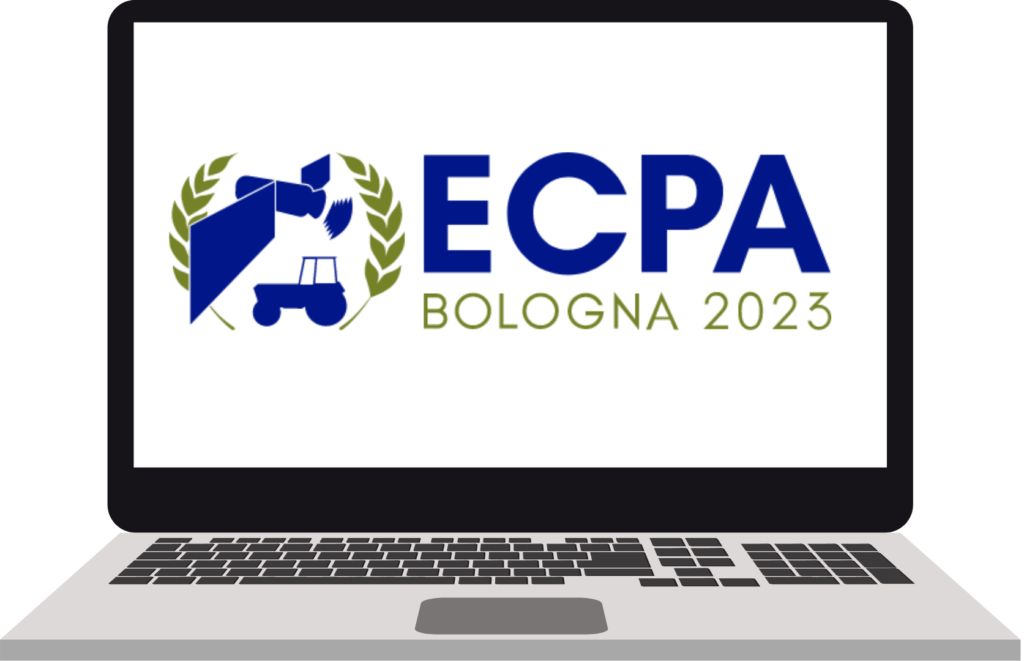 The 14th European Conference on Precision Agriculture
The 14th European Conference on Precision Agriculture
![]() July 2-6, 2023
July 2-6, 2023
![]() Bologna, Italy
Bologna, Italy ![]() Info
Info
The 14th European Conference on Precision Agriculture will be held in Bologna, Italy on July 2-6, 2023! The Conference will unleash the potential of Precision Agriculture by showcasing the results of ongoing research and applications in the sector. Organised under the auspices of the International Society of Precision Agriculture (ISPA), by the Department of Agricultural and Food Sciences of the University of Bologna, the ECPA sessions will present Precision Agriculture from the viewpoint of scientists, crop consultants, advisors, extension personnel, agronomists, producers, and other practitioners.
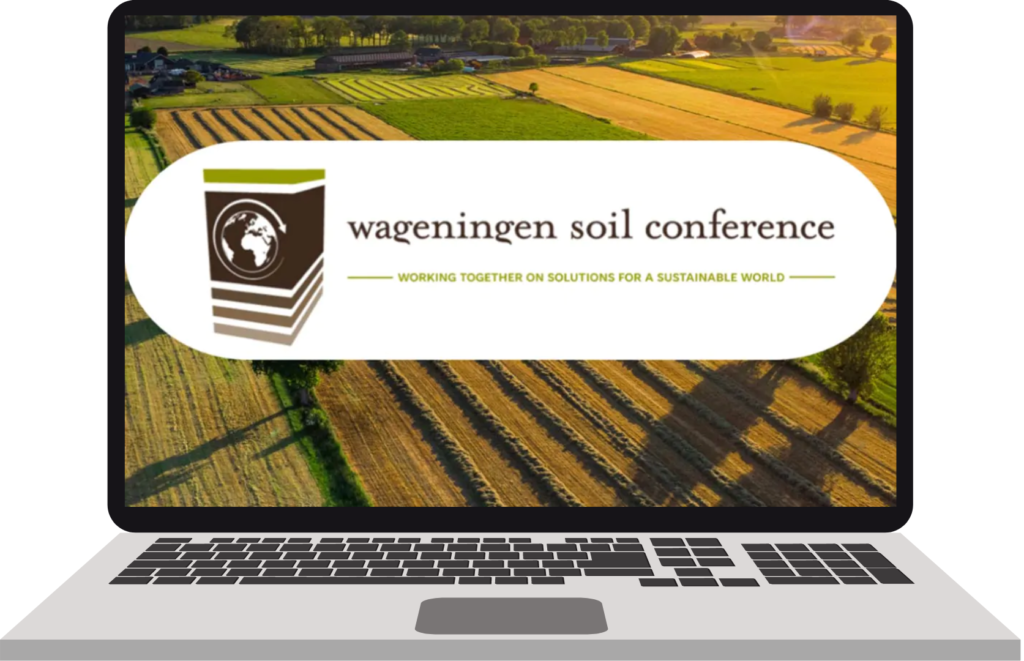 Wageningen Soil Conference 2023
Wageningen Soil Conference 2023
![]() August 28 – September 1, 2023
August 28 – September 1, 2023
![]() Wageningen, The Netherlands
Wageningen, The Netherlands ![]() Info
Info
Wageningen University & Research and ISRIC are delighted to invite you to the fifth edition of the Wageningen Soil Conference. As in previous editions, the aim is to discuss the importance of soils. In the 2023 edition, the focus will be on working together on solutions for a sustainable world. The four conference days are divided into different topics and specifically Soils for Society, Advances in Measuring and Modelling Soil Processes, Mapping & Evaluation of Soil Functions across Scales and Soils for Nature-Based Solutions. The conference has an interactive character, with traditional conference talks in the mornings, followed by interactive masterclasses, side events and an engaging evening programme.
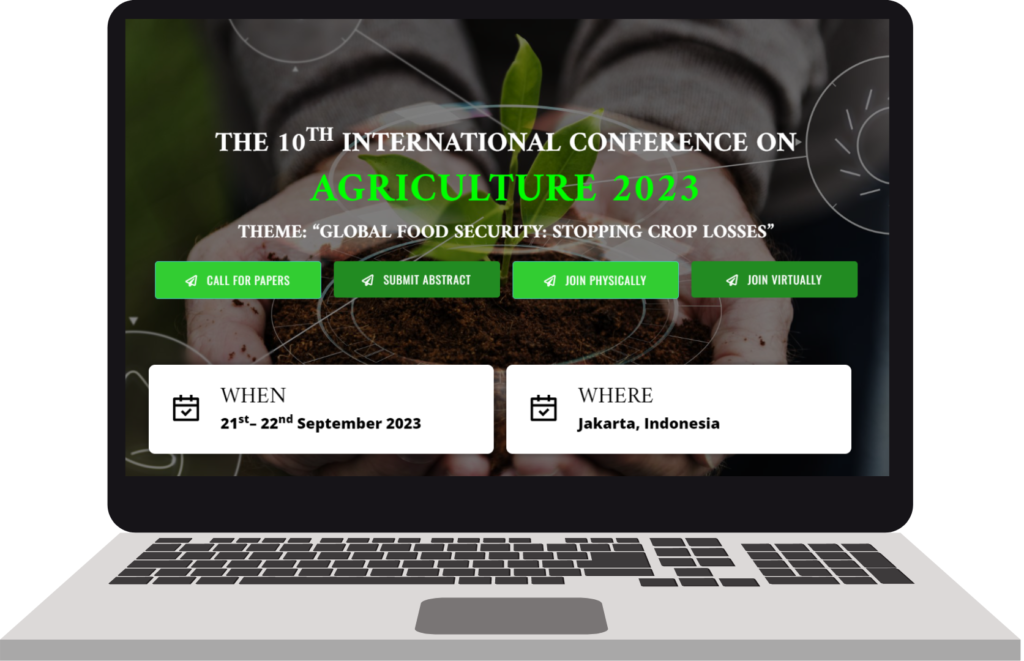 10th International Conference on Agriculture 2023
10th International Conference on Agriculture 2023
![]() September 21-22, 2023
September 21-22, 2023
![]() Jakarta, Indonesia
Jakarta, Indonesia ![]() Info
Info
The 10th International Conference on Agriculture 2023 will take place from the 21st until the 22nd of September 2023 on a Hybrid Platform. AGRICO 2023 seeks to bring together governments, academia, civil society, the private sector, and other stakeholders to develop and implement innovative solutions to the challenges of food security and agricultural development. This year’s theme is “Global Food Security: Stopping Crop Losses” focusing on the efforts all over the world to achieve Food Security. AGRICO 2023 will include a combination of vital tracks contributing to Food Security, crop losses and agricultural future.
News to read
 Agtech research from the Environmental Defense Fund
Agtech research from the Environmental Defense Fund
Emergent agricultural technology is often defined by market opportunities that focus on maximizing output (i.e., yield). This narrow, extractive view fails to recognize and harness the multitude of environmental and societal benefits agricultural technology can provide. The Environmental Defense Fund recently published the “Agriculture Technology Discovery Report” that provides a high-level overview of how four technology fields — artificial intelligence (AI), robotics and automation, biologicals, and genetics — can be valuable tools in agricultural operations and contribute to four agroecological goals: reducing water use, supporting soil and plant health, controlling pests and diseases, and reducing agricultural greenhouse gas emissions. The report is available here.
 New EEA Report on Soil Monitoring
New EEA Report on Soil Monitoring
The new Report issued by the European Environmental Agency ‘Soil monitoring report’ presents a comprehensive set of common indicators to assess soil health as well as risk-based thresholds. The goal is to inform interested parties about protection and restoration needs and soil-related policies in Europe. For each of a selection of indicators, the EEA report identifies thresholds beyond which soil functioning, is negatively affected. These thresholds can be regarded as critical tipping points for soil health and action points to safeguard soils. The EEA assessment supports the EU soil strategy for 2030, which is an integral element of the European Green Deal. More
 Smart Farming Global Market Report 2023
Smart Farming Global Market Report 2023
According to the latest Research and Markets report “Smart Farming Global Market Report 2023” the European smart farming market was valued at $3,993.7 million in 2022 and is expected to reach $8,420.6 million in 2027, following a CAGR of 16.09% during 2022-2027. The growth in the European Smart Farming Market is expected to be driven by an increase in the adoption of IoT and artificial intelligence, digitalization of agriculture operations, and a rise in the dependence on advanced technologies to enhance productivity. The Smart Farming Market is in a growing phase owing to different advanced technologies in the market. Sensors and guidance and steering systems are the most important hardware components used in the modern agriculture operations. Find out more...
 The EU toolbox for Integrated Pest Management
The EU toolbox for Integrated Pest Management
The European Commission has recently published a database presenting an overview of the IPM methods currently available, accompanied by a study assessing their effectiveness and prospects for their further uptake. This database includes about 1300 examples of good practices, techniques and technologies and 273 crop-specific guidelines. The database, hosted in the JRC’s Data-Modelling platform of resource economics (DATAm), will be updated with additional examples on a regular basis. In parallel to this large overview a study explores current IPM practices and their potential to help to reduce the dependency on chemical pesticides, their cost for implementation and their overall effectiveness. Access the toolbox and the report.
 New tool maps the state of soil health
New tool maps the state of soil health
EU-wide harmonised soil datasets and a novel methodology are among the main features of the soil health dashboard, a new tool of the EU Soil Observatory (EUSO), developed and run by the JRC. The dashboard supports the forthcoming European Commission proposal for a soil health law and indicators proposed by the Soil Mission of the EU’s research and innovation programme Horizon Europe. The EUSO soil health dashboard is based on a set of 15 indicators of soil degradation processes, covering the following nine topics: soil erosion, soil pollution, nutrients, loss of soil organic carbon, loss of soil biodiversity, soil compaction, soil salinisation, loss of organic soils and soil sealing. Check the EUSO dashboard.
 Innovation for Agriculture chooses for Climate Smart Farming
Innovation for Agriculture chooses for Climate Smart Farming
Innovation for Agriculture (IfA) committed to the goal of Climate Smart Farming has progressed its Regenerative Agriculture department and relaunched it under the new ‘Climate Smart Farming’ initiative. The initiative will still focus on practices which enrich soil, protect water, and increase biodiversity, but will also emphasise the developments needed for future farm transport, and circular solutions for biowastes, clean energy, nutrients and future fuels. IfA will as such demonstrate how farming businesses can better use nutrients, move away from reliance on red diesel and generate clean energy. Read more...
Stay updated
Do you want to stay updated with all the latest on the STARGATE project?
and don’t forget to follow us on social media...
PROJECT COORDINATOR: Prof. Dr. Dionysis Bochtis | Director
Center for Research and Technology Hellas (CERTH)
Institute for Bio-economy and Agri-technology (iBO)
d.bochtis@certh.gr








